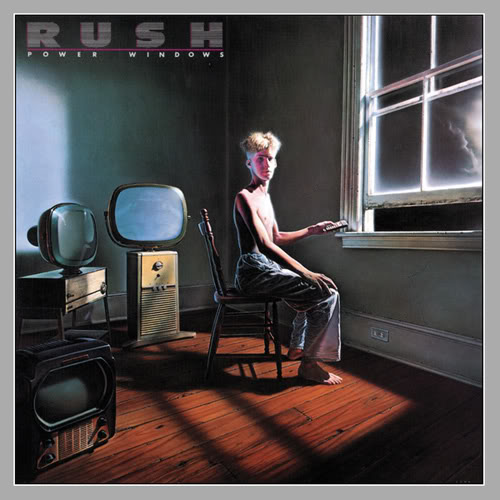
Power Windows (1985)

1.The Big Money
2.Grand Designs
3.Manhattan Project
4.Marathon
5.Territories
6.Middletown Dreams
7.Emotion Detector
8.Mystic Rhythms
If Grace Under Pressure signaled that Rush were ready to evolve into the electronic age, then Power Windows confirmed they were relishing the transformation. Whether emboldened by the previous album’s artistic success or simply swept up by the endless sonic possibilities of mid-1980s production, the band leaned fully into the moment. A new co-producer, Peter Collins, was brought on board, and from the opening bars onward, it’s clear that synthesisers, samplers, and sequencers weren’t just added ingredients — they were now part of the main course.
So immersive is the electronic layering, one might imagine the trio walking into a studio already filled with shimmering synth beds and digital textures, and deciding to write a Rush album over the top of it all. For some purists, this was heresy. But for the rest — and indeed, for anyone willing to judge on merit rather than tradition — this is nothing less than a stunning record.
Rush, as ever, do not lose themselves in the swirl of innovation. Rather, they adapt and command it. The key to Power Windows lies not in the technology, but in the craft. Strip away the electronic gloss, and you’re still left with intricately constructed, passionately performed songs. In another universe, recorded with bare-bones instrumentation, it would still be a triumph. But in this reality, it’s also a masterclass in how to evolve without surrendering one’s identity.
The arrangements are dizzying in their ambition. Orchestras appear on Manhattan Project and Marathon (the latter even boasting a full choir), and yet somehow, nothing feels excessive or bloated. This is Rush operating at full cerebral tilt, but with an emotional core that had grown markedly stronger over the years.
The first three tracks, in particular, crackle with energy and immediacy. The Big Money, Grand Designs, and Manhattan Project all showcase the band’s ability to rock hard while expanding their sonic palette. And although this may not be a head-banging, riff-dominated album in the conventional sense, Rush had long since transcended the limits of conventional.
Take Territories, for example. A rhythmic, Caribbean-inflected piece that more closely resembles a percussive dance ritual than anything previously associated with Canadian power trios. Peart, naturally, sounds as though he’s having the time of his life. Then there’s the closer, Mystic Rhythms, an ethereal meditation that picks up the vibe of Territories and slows it down to a hypnotic drift. It’s an understated masterpiece, and has become a fan favorite — perhaps because it taps into that quintessential Rush theme of wrestling with the unknowable.
If there were any doubts about how the band themselves viewed this era, they were laid to rest in 2012, when their tour featured five of the eight tracks from Power Windows during selected shows. That’s a remarkable show of faith in an album more than a quarter-century old — and one that had once divided fans upon release.
The truth is, Power Windows has aged better than anyone might have expected. In many ways, it’s one of the most courageous albums in the band’s catalogue — a perfect union of technology, intelligence, and instinct. It may not sound like Rush of old, but make no mistake: it is unmistakably Rush.
Go back to the main page
Go To Next Review